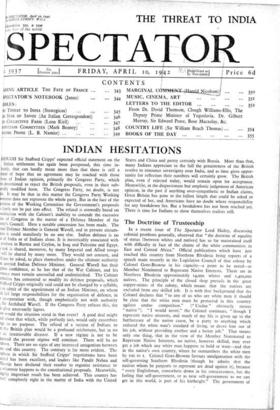INDIAN HESITATIONS
HOUGH Sir Stafford Cripps' expected official statement on the Indian settlement has again been postponed, this time in- initely, that can hardly mean more than that there is still a timer of hope that an agreement may be reached with those 'ions of Indian opinion, primarily the Congress Party, which m determined to reject the British proposals, even in their sub- tially modified form. The Congress Party, no doubt, is not .. It may be that in this matter the Congress Party Working mittee does not represent the whole party. But in the face of the position of the Working Committee the Government's proposals t clearly not be put into effect. The refusal is avowedly based on satisfaction with the Cabinet's inability to concede the excessive ins of Congress in the matter of a Defence Member of the :eroy's Council. Here a notable concession has been made. The sent Defence Member is General Wavell, and in present circum- nces it could manifestly be no one else. Indian defence is no sir of India or of Indians alone. It is inextricably associated with position in Burma and Ceylon, in Iraq and Palestine and Egypt. e task is shared, moreover, by many Imperial and Allied troops I will be shared by many more. They would not consent, and Id not be asked, to place themselves under the ultimate authority in untried Indian Defence Minister. General Wavell has their tplete confidence, as he has that of the War Cabinet, and his remacy must remain unassailed and undiminished. The Cabinet ertheless has, consented to modify its defence proposals, which Stafford Cripps originally said could not be changed by a syllable, S to admit of the appointment of an Indian Minister, on whom Id fall large responsibilities for the organisation of defence, in e co-operation with, though _emphatically not with authority Sir Archibald Wavell. If the Congress Party refuses this, the
le plan necessarily lapses. .
Ow would the situation stand in that event? A good deal might aid about that which, while perfectly just, would only exacerbate ngs to no purpose. The refusal of a section of Indians to Pt the British plan would be a profound misfortune, but in no e an irretrievable disaster. If a new regime is not to be pirated the present regime will continue. There will be no ttlown. There are no signs of any increased antagonism between Ins and this country. The contrary is far more evident. The sphere in which Sir Stafford Cripps' negotiations have been ucted has been excellent, and leaders like Pandit Nehru and Moonje have declared their resolve 'to organise resistance to 4 whatever happens to the constitutional proposals. Meanwhile, Ilighly important result has been achieved. This country has tself completely right in the matter of India with the United
States and China and pretty certainly with Russia. More than that, many Indians appreciate to the full the genuineness of the British resolve to renounce sovereignty over India, and as time gives oppor- tunity for reflection their numbers will certainly grow. The British plan, even if rejected today, would remain open for acceptance. Meanwhile, in the dispassionate but emphatic judgement of American opinion, in the past if anything over-sympathetic to Indian claims, Great Britain has gone to the fullest length that could be asked or expected of her, and Americans have no doubt where responsibifity for any breakdown lies. But a breakdown has not been reached yet. There is time for Indians to show themselves realists still.


























